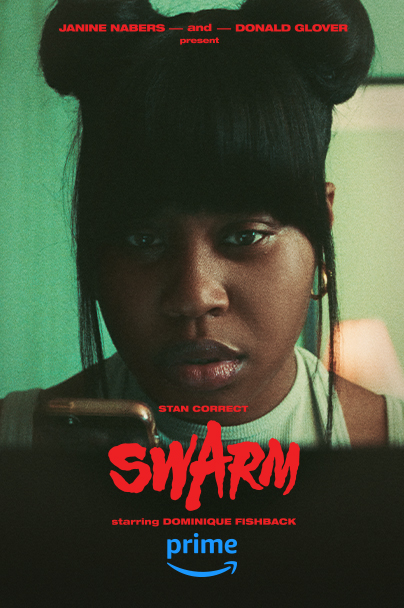Amazon Prime’s Swarm Unsettling, Memorable
The Amazon Prime series Swarm, starring Dominique Fishback as a serial killer, released March 17.
When I first caught wind of the Amazon Prime TV series Swarm, my brain bounced to an implicit word association game — Swarm, anarchy, hierarchy, queen bee, post-apocalyptic societal disarray. In a climate marked by justified paranoia and a media culture frontlined by plausible dystopia like The Last of Us, I was sure Swarm’s title assumed a kind of ecological allusion to the planet’s encroaching demise and society’s digitalized disconnect and hyper-coagulation. I was both partially right and overwhelmingly wrong. Co-directed by Atlanta‘s Donald Glover and Janine Nabers, Swarm supplies a psychologically fraught and genre-vexing serial killer series, a disorienting dance between satirical comedy and truly nauseating horror.
I began watching the show with a drive to untangle the mystified impressions I had gleaned from my peers: the show is in many ways about Beyoncé’s fanbase, but also not at all. The show is hard to watch, but impossible not to watch all at once. In the end, I understood the kind of stupefaction Swarm produces wholeheartedly. It’s the kind of show with a drive to trip you up, to dupe you, to challenge your preconceptions, and to dislodge your automatic assumptions.
Swarm opens with an unsettling disclaimer: “This is not a work of fiction. Any similarity to actual persons, living or dead, is intentional.” We open to a close-up shot of the show’s protagonist, Dre, a young Black woman whose obsession with fictional pop singer Ni’jah quickly betrays an acute psychological codependency. Dre lives alone with Melissa, a woman she considers her ‘“sister” and whom she regards with a kind of desperate reverence comparable only to that which she feels towards Ni’jah. At one point early on in the first episode, Melissa wraps her arms around Dre, and Dre begins to kiss a scar on Melissa’s wrist with dolorous fervor, as if the scar were still an open wound. “You’re weird as f**k,” Melissa says to Dre, “but I love your passion.” This evaluation acts like a kind of prophecy for Dre’s increasingly unsettling character arc, her acts of unprecedented violence often ushered by visual or auditory foreshadowing, such as the itch-inducing sound of bees buzzing in dissonant unison. Though Dre is decidedly taciturn, visual cues and auditory flourishes become signifiers of her unraveling psyche. In other words, if you hear bees buzzing, you know death is likely on the horizon.
A mere 25 minutes into the show’s first episode, Melissa, devastated by the news that her toxic boyfriend has cheated on her, commits suicide. Dre, lonely and reserved, leaves home to set off on a blood-soaked odyssey to reconcile her totalizing grief. First, she bludgeons Melissa’s adulterous boyfriend to death. At this initial murder, the audience sees Dre choking on sobs, crawling to the fridge and shoving a mixture of blood and pumpkin pie into her mouth with an indescribable urgency. Dre then embarks on an unpredictable quest to kill people who have publicly dissed Ni’jah on Twitter, with her expressions of remorse gradually diminishing and her serial murder habits slowly calcifying. For example, she always eats a snack after murder. Food and death become part and parcel with each other, a sinister admixture representative of Dre’s psychological drive to fill the hole left by Melissa’s death.
And then there’s the show’s pointedly flagrant allusions to pop culture. Ni’jah is Beyoncé. Ni’jah’s fanbase, and the titular ‘swarm,’ refers directly to the BeyHive, Beyoncé’s fanbase. Although the show undertakes a bold strategy in the directness of these iconographic stand-ins, such word play and pop cultural critique doesn’t seem to be the main point. Sure, Ni’jah is Beyoncé, but she’s also Melissa; Dre’s fragile reality relies on the warping of people’s identities, and it proves ultimately useless to force significance onto structured categories.
Cultural significance takes on a much more pointed meaning in regards to Dre’s interactions with the white gaze. In an episode containing Billie Eilish’s acting debut, Dre encounters a cultish posse of pseudo-spiritual white women, the leader of which is played by Eilish. “I feel so connected to you,” the women insist over and over, even though Dre has barely uttered a word. During this episode in particular, reality and surreality conjoin in a haunting middle reminiscent both of Midsommar and media in the Afro-Surrealist genre, such as Get Out and Atlanta. Although so much of the show takes on a decided slant to reality, these scenes reflect the lived absurdity of the white gaze.
Since its release on Amazon Prime on March 17, the show has garnered many different channels of media attention. As tends to be the unfortunate case, articles fixating on a graphic sex scene in the show’s first episode abound. An article from Collider declares, “Thanks to ‘Swarm,’ we have a new Slasher icon.” A Vulture piece addresses the novelty of a Black woman portrayed through cinema’s age-old madwoman trope, ultimately claiming the show fails to fissure typified representations of “femininity, disability, and power.” The New York Times similarly claims that the show, though textured by Glover’s distinctive aesthetics, ultimately fails to flesh out Dre’s character beyond the titillating. It seems, however, that there is one thing everyone can agree on: Dominique Fishback provides a gorgeous and haunting performance as Dre, and the show, shot fully on film save for a single mockumentary episode, is aesthetically striking. Ultimately, I found Swarm to be not only a singular and memorable viewing experience, but worthwhile especially due to the huge range of discussions it may start among viewers.











